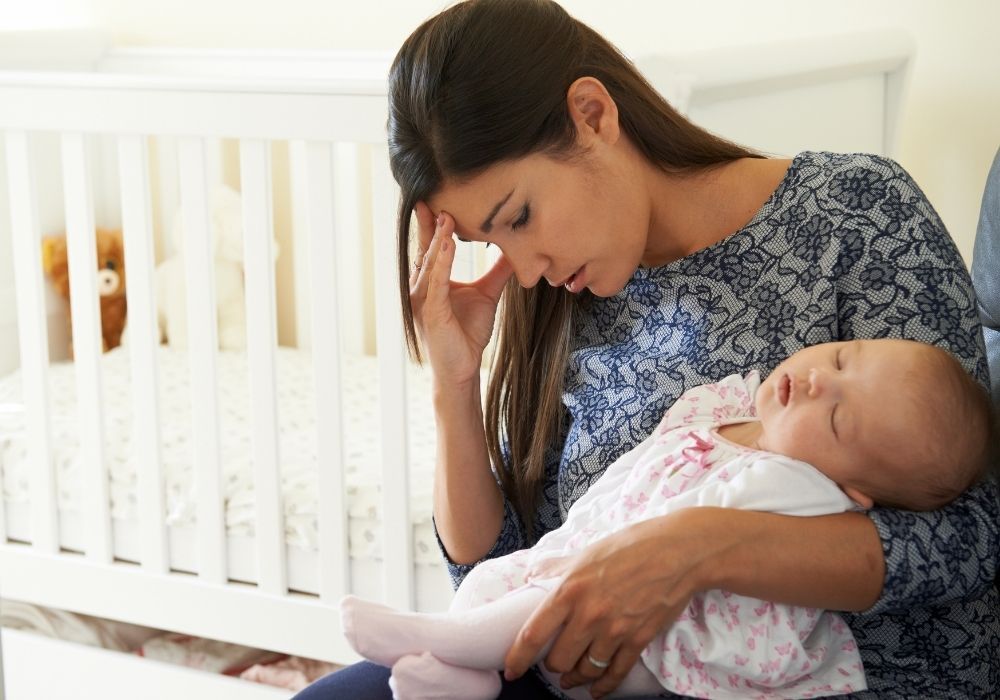
Having a baby is life-changing for new moms and the new responsibilities, roller-coaster of hormones, and scant sleep can lead to postpartum depression. Plenty of moms experience “the baby blues” as they enter this new phase of life shortly after giving birth and feel overwhelmed as they adjust to motherhood and a very different looking schedule. For some moms, however, those feelings linger and get worse instead of better, developing into postpartum depression (PPD).
Baby blues may come and go in the first few days after childbirth and can leave women feeling depressed, anxious, upset, and wondering if she is fit to care for a baby. The major difference between baby blues and postpartum depression is the length of time each lasts. Baby blues are known to get better within one to two weeks of giving birth without any treatment. Postpartum depression, on the other hand, most commonly starts about 1-3 weeks after childbirth and can last up to 1 year after having a baby.
What is postpartum depression and what causes it?
Postpartum depression is a medical condition that women experience after giving birth that can come with intense feelings of anxiety, sadness, and despair and prevent them from being able to go about normal life. There are a number of causes associated with postpartum depression including:
- A history of depression: Women who have had depression at any point or who are currently being treated for depression have an increased risk of developing postpartum depression.
- Changes in hormone levels: Decreased levels of estrogen and progesterone in the hours after childbirth can trigger depression.
- Fatigue: It’s common for mothers to feel tired after giving birth and adjusting to the baby’s schedule. It can take weeks for a woman to regain her strength and energy. For women who have had a cesarean delivery, it can take even longer.
- Emotional factors: Feelings of doubt, guilt, and sadness are common after pregnancy and it can take a long time for new mothers to adjust to having a baby. These emotions can cause stress and affect a woman’s self-esteem.
- Lifestyle factors: A lack of support or other stressful life events can increase a woman’s risk of postpartum depression.
Postpartum depression treatment options
Postpartum depression may be treated with medications called antidepressants which is often used in combination with talk therapy. Antidepressants operate by balancing out the chemicals in the brain that control moods.
Antidepressants can come with side effects but most are short-term and temporary. If you find that your side effects are severe, unusual, or keep you from going about your normal daily habits, you should notify your healthcare provider. It may be that you need a different type of antidepressant.
Can postpartum depression be prevented?
If you have a prior history of depression at some point or are taking an antidepressant, you should tell your OBGYN or healthcare provider early on in your prenatal care. Ideally, you should tell your doctor before you become pregnant as he or she may suggest that you begin treatment soon after giving birth in order to prevent postpartum depression.
If you think you or someone in your family may be suffering from postpartum depression, it is important to see an obstetrician–gynecologist (OBGYN) or other healthcare provider as soon as possible.

Written By Tidewater Physicians For Women


828 Healthy Way Unit 330
Virginia Beach, VA 23462
Fax: 757-467-0301
844 Kempsville Road #208
Norfolk, VA 23502
Fax: 757-461-0836
Appointments:
757-461-3890
Inquiries:
757-461-3890
Notice of Privacy Practices
Notice of Financial Policies

© Tidewater Physicians for Women